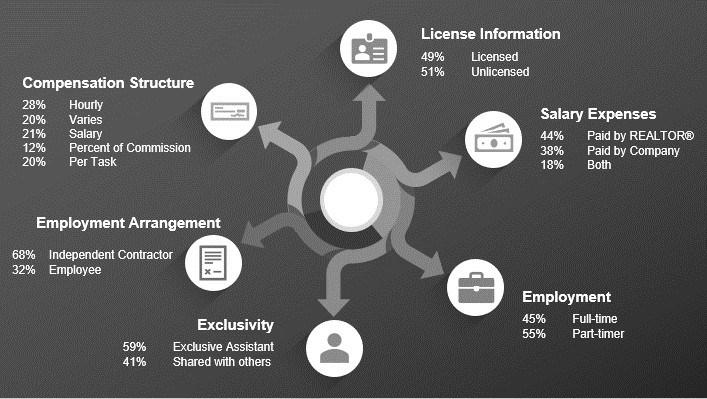
7 minute read
Module 1: Your Career In Real Estate 9
EXERCISE
My Vision Statement:
Write down the first draft of a vision statement that will establish your value proposition to a real estate agent or team looking for a professional assistant.
The Real Estate Industry
The Business of Real Estate
Real estate is a part of the Canadian fabric and accounts for a tremendous amount of wealth and value in Canada. The sales of real estate and the various businesses that are impacted by it are a significant economic part of the wellbeing of a civilization.
Many agents choose to specialize in a particular type of real estate business from residential to commercial and then often they select a niche like first-time home buyers.
Real property describes the land and improvements (such as a house or commercial building) on the property. Real property is divided into five primary classifications.
RESIDENTIAL
This includes existing and new construction homes that are intended to be lived in as a person’s residence. The most common category is single-family homes. There are also condominiums, co-ops, townhouses, duplexes, triple-deckers, quadplexes, high-value homes, multi-generational and vacation homes.
COMMERCIAL
This includes properties that are intended to be income producing and includes shopping strips, education buildings, medical facilities, hotels, and office buildings.
This includes properties that are intended to manufacture goods and can include warehouses, research facilities, development facilities, car builders, shipping yards, food storage and more.
This includes raw land, farmland, wooded area, vacant lots, and other undeveloped property.
A type of business service related to property is the management of properties on behalf of the owner, known as a landlord. Many agents will elect to work on behalf of a property owner to maintain the property and work with the tenant to collect rent, make repairs and limit vacancies.
INDUSTRIAL
LAND/AGRICULTURE
PROPERTY MANAGEMENT
The Institutions of Real Estate
Being a professional assistant means that you’re a part of a larger industry. The agent functions as a trusted advisor and guide for their clients, the professional assistant will work alongside them to ensure that the client’s goals are met, and the agent is able to function at a higher level of proficiency.
▪ Real Estate Brokers and Brokerages
For over a hundred years the industry as functioned as a guide for consumers seeking to buy, sell, rent, or lease real estate. The real estate brokerage is the fundamental element of this industry. The brokerage itself is made up of a collection of real estate agents and associate brokers who function on behalf of the principal broker to serve the client’s needs. All operations of the real estate agent, the performance of their tasks and duties, are overseen by a broker. The broker carries the burden of all liability and responsibility for the actions of the real estate agent.
In most provinces the real estate broker is chiefly responsible for the real estate client and the relationship is between those two parties. Real estate agents function on behalf of the Broker to fulfill the obligations and duties of the broker to their clients. The Broker will have company policies in place to oversee the activities of the real estate agent. Trust accounts are managed by the Broker for money or things of value that are entrusted to the firm to hold as security for the client’s performance ona contract. The Brokerage also handles receiving and disbursing the commissions that are earned by the real estate agent.
In most cases agents are associated with the brokerage as an independent contractor, which means that the agent has their own real estate license and chose to affiliate with a firm to service their clients. Agents, as independent contractors, are their own business entity under the brokerage. The agent does not usually collect a salary and is obligated to cover their own business expenses, pay their own income taxes, and maintain their licenses.
The role of Salespersons, Brokers and Agents is to list real property for sale or lease, represent buyers, sellers, and tenants, and work under the supervision of the broker.
▪ The Real Estate Commission
Every province has different licensing requirements for real estate agents, brokers and other parties working on behalf of clients. The real estate agent must be licensed in the province in which they are conducting business on behalf of clients. The Real Estate Commission of each province is chartered by the province to protect the consumer by requiring specific standards to be met for a real estate agent to begranted and keep a real estate license. The Real Estate Commission has authority to discipline real estate agents and uphold the laws of the individual province as they pertain to the licensed practice of realestate. The Real Estate Commission will also require continuing education and minimum professional development requirements to real estate agents to keep their licenses.
Commissions
The primary source of income for most agents is the money they earn from selling real estate. The agent agrees to take a listing and the seller often agrees to pay a portion of the equity in their property to the listing agent who then shares a portion of that with the buyer’s agent. In some instances, the buyer may pay the agent for the services that the agent is rendering.
All money earned from the client is paid to the firm and then the Principal Broker distributes it to the real estate agent who facilitated the transaction. In most cases the broker retains a part of the commission to cover the costs of operating the firm, providing tools and resources to the agent, and promoting the brand to the public.
Commissions are negotiated by the broker or agent with the clients throughout the transaction. There are no standard fees for service and all parties are free to negotiate fees for various levels of service.
Compensation is often earned at the time a contract is ratified by the parties, but usually not paid to the real estate firm until after the transaction has closed. Commissions can only be paid by and to licensed real agents. In most provinces, agents may not give “gifts” or things of value to unlicensed parties in return for referral of clients.
Service Providers
There are a variety of individuals who will be involved in the real estate transaction. The vendors will often have established relationships with the real estate agent or team. These relationships are valuable for both the vendors and the agents. Frequently agents and teams assist clients by coordinating these vendors and their various duties to the buyers and sellers throughout a transaction. These vendors render types of services from interior decorators to repair persons. The most common vendors include mortgage providers, inspectors, and settlement service providers.
▪ Mortgage Providers
Mortgage providers assist buyers with attaining loans so that they can purchase their homes. Mortgage lenders can be brokers who represent various lending institutes or direct lenders who only represent one lending institute. The loan officer will communicate with the buyer and the agent to provide updates on the loan process and coordinate the appraisal. Often the loan will have conditions which the buyer needs to meet in order to proceed and an agent will be called upon to assist.
▪ Inspectors
Most real estate sales include a discovery period in which the buyer is given access to the property to do reasonable inspections to ensure that the house is safe and in good working order, or a feasibility study to ensure that the land will work for their intended purposes. The range of inspections will depend on the conditions the buyer and seller agreed upon in the contract. Home inspectors, surveyors, well and septic inspectors, structural engineers and others will need to know what the range of their inspections will be, will need access to the property, coordination on when inspections will be done and how to handle post inspection reports and contingencies. The professional assistant will routinely be involved in tracking and coordinating these individuals.
▪ Settlement Providers
Settlement service providers are often attorneys who are tasked with preparing and recording deeds, land transfer records, and managing the funds involved in a real estate transaction. Someprovinces allow layperson settlement firms where an attorney may only prepare the deed and other licensed individuals coordinate and execute the closing settlement event. These firms will work closely with the agent and the professional assistant to ensure that contacts, deeds, financial arrangements, and legal documents are properly managed. The settlement provider also ensures that the transaction and conveyance is recorded with the court systems for public recordation.










